
|
African Population Studies
Union for African Population Studies
ISSN: 0850-5780
Vol. 25, No. 2, 2011, pp. 509-542
|
 Bioline Code: ep11040
Bioline Code: ep11040
Full paper language: English
Document type: Research Article
Document available free of charge
|
|
|
African Population Studies, Vol. 25, No. 2, 2011, pp. 509-542
| en |
Explaining the persistence of racial gaps in schooling in South Africa
Ardington, Cally; Branson, Nicola; Lam, David & Leibbrandt, Murray
Abstract
This paper analyses the large racial differences in progress through secondary school in South Africa using recently collected longitudinal data. Following the progress of students who were enrolled in Grades 8 and 9 in 2002 in the Cape Area Panel Study, we document large differences in the probability of grade advancement between white, coloured, and African youth. Probit regressions indicate that grade advancement between 2002 and 2005 is strongly associated with household income and with respondents’ scores on a baseline literacy and numeracy test. We fully explain the white and coloured advantage over Africans in progress through school when we control for baseline test scores, previous grades failed, and per capita household income. The results suggest that the early disadvantage of African secondary students is a major factor driving poor progress through secondary school, with continued racial gaps in grade progression contributing to persistent racial gaps in ultimate schooling attainment. These key results do not change when we re-estimate these equations separately by race and conduct our statistical tests across these equations or even when we conduct post-estimation counterfactual simulations or propensity score matching. As a final check we add a set of school specific factors to the probit regressions by race. These factors are not statistically significant in the models; their introduction only marginally reduces the importance of the baseline test scores and previous grades failed and they are not important in the counterfactual analysis. All in all the paper provides very strong evidence that knowledge accumulated by Grade 8 or 9 is a critical determinant of progress through secondary school and that the equalizing of secondary school quality is unlikely to eliminate racial gaps in grade progression without improvements at earlier grades.
|
| |
© Copyright 2011 - African Population Studies
Alternative site location: http://www.uaps-uepa.org
|
|
